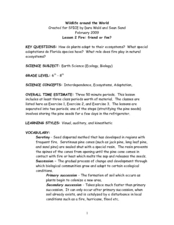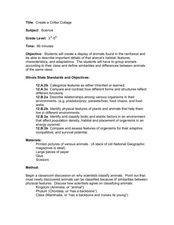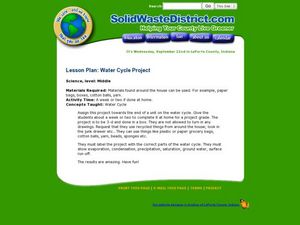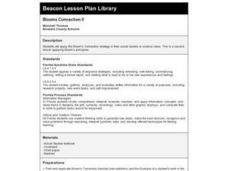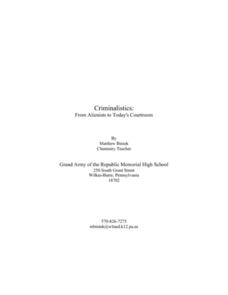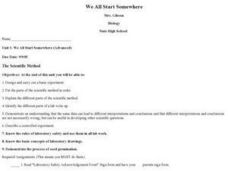Curated OER
Seed Germination
Young scholars germinate a Mung Bean seed. In this seed lesson students conduct an experiment germinating a Mung Bean. They apply three different treatments to the seeds: dry, moist, and underwater incubation.
Curated OER
Animal Classification
Third graders differentiate between vertebrates and invertebrates, and identify the main characteristics of mammals, fish, reptiles, amphibians, and birds. They sort and categorize different types of balls, discuss the characteristics...
Curated OER
Wildlife Around the World
Students examine how plants are able to adapt to their ecosystem and the role that fire plays in changes through the years. In this ecosystem lesson plan students complete several exercises focussing on plants and their adaptations...
Curated OER
Create a Critter Collage
Students create a collage. In this animal classification lesson, students discuss why and how scientists classify animals. Students view pictures of different animals and decide which class each animal belongs to. Students compare...
Curated OER
Water Cycle Project
Students complete a water cycle project. In this Earth science lesson, students use recycled objects from around their homes to illustrate the water cycle. Students illustrate evaporation, condensation, precipitation, saturation, ground...
Curated OER
Predicting: Making a Hypothesis
Students analyze information from various sources to create a hypothesis about the origin of a family artifact. Students create a hypothesis about the origin of the item and write a paragraph explaining why they believe the hypothesis is...
Curated OER
Everything's Under Control
Fifth graders prepare for a "Mad Scientists Fair" by creating a controlled study and by conducting experiments. They make and record observations and classify specimens according to characteristics. They compare results to their original...
Curated OER
What Do Monarch Caterpillars Eat?
Learners record and analyze what types of food monarch caterpillars will eat.
Curated OER
Blooms Connection II
High schoolers apply Bloom's Connection strategy to a chapter in their book. They create questions using Blooms' hierarchy.
Curated OER
The Battle of Stones River: The Soldiers' Story
Learners organize items in a "doohickey kit" distributed by the teachers, creating categories using classification schemes. In this classification instructional activity, students compare systems within groups and write questions that...
Curated OER
Classification
Students gather and classify samples of a given item (rocks, fossils, seeds, etc.) They discuss various ways of classifying and that there are many different ways that are acceptable.
Curated OER
The Characteristics of Living Things
Eighth graders explore the characteristics of living things. In this living things lesson plan, 8th graders review as a class the cell theory and the characteristics of living things. They answer questions about how to determine if...
Curated OER
Will Biotech Crops Solve World Problems?
Students read an online article to examine what biotechnology and agricultural biotechnology are. They answer questions and complete worksheets based on the article's information.
Curated OER
Science: Criminalistics - A New Look at Crime
Students examine the world of forensic science, focusing on fingerprint analysis. In the lesson, they implement a method by which fingerprints of class members are categorized and identified. Elementary students study classification...
Curated OER
God's Creation
Second graders explore religion by analyzing the state of the country. In this American creation lesson, 2nd graders read that God created the world and therefore the United States and all of the beautiful things within the country....
Curated OER
Hare vs. the Tortoise
Seventh graders identify and create questions and hypotheses, dependent and independent variables and form a conclusion that can be answered and tested through scientific experimental investigation. For this relationship lesson, 7th...
Curated OER
We All Start Somewhere
Students demonstrate an understanding that the same data can lead to different interpretations and conclusions and that different interpretations and conclusions are not necessarily wrong, but can be useful in developing other scientific...
Curated OER
Rapid Mycological Assessment
Students examine types of mycology methods. They practice using new vocabulary and answer key questions. They complete a field survey and analyze their results.
Curated OER
U.S. History: de Soto's Alternate Route
Eighth graders examine various maps associated with Hernando de Soto's expedition. By comparing their textbook maps with newer maps, they answer a battery of focus questions. Using Microsoft Word, 8th graders answer the questions...
Curated OER
Classifying Living Things
Students identify how to classify living things. They classify various concepts including family members, kinds of clothing, numbers, shapes, and vocabulary words. They discuss how to classify various concepts and classify pictures of...
Curated OER
Classified Information - Part 1: Shapes
Third graders investigate how and why scientists use classification. They discuss classification strategies using animals, and as a class fill in a flowchart with their responses. Next, in small groups they cut out a variety of shapes...
Curated OER
Classifying and Constructing Corners
Fifth graders, after seeing Honeycomb examples, complete a Classifying Angles worksheet, Clock worksheet, and Defining Angles worksheet.
Curated OER
Food Web Chasey
Students work together to review the concepts of food webs and food chains. They describe the role of plants and animals when dealing with the cycling of energy. They identify any behavioural strategies to help the animals survive.
Curated OER
A Golden Age: Three West African Empires
Seventh graders research the kingdoms and rulers of Ghana, Mali and Songhay. In groups, they explore the trade routes and the spread of Islam. Using the internet, textbook and other sources, 7th graders collect information and write a...
Other popular searches
- Scientific Method Worksheet
- Scientific Method Activities
- Scientific Method Variables
- The Scientific Method
- Scientific Method Hypothesis
- Six Step Scientific Method
- Scientific Method Lab
- Scientific Method Powerpoint
- Basic Scientific Method
- Scientific Method Botany
- Scientific Method Lab Report
- Scientific Method Vocabulary


